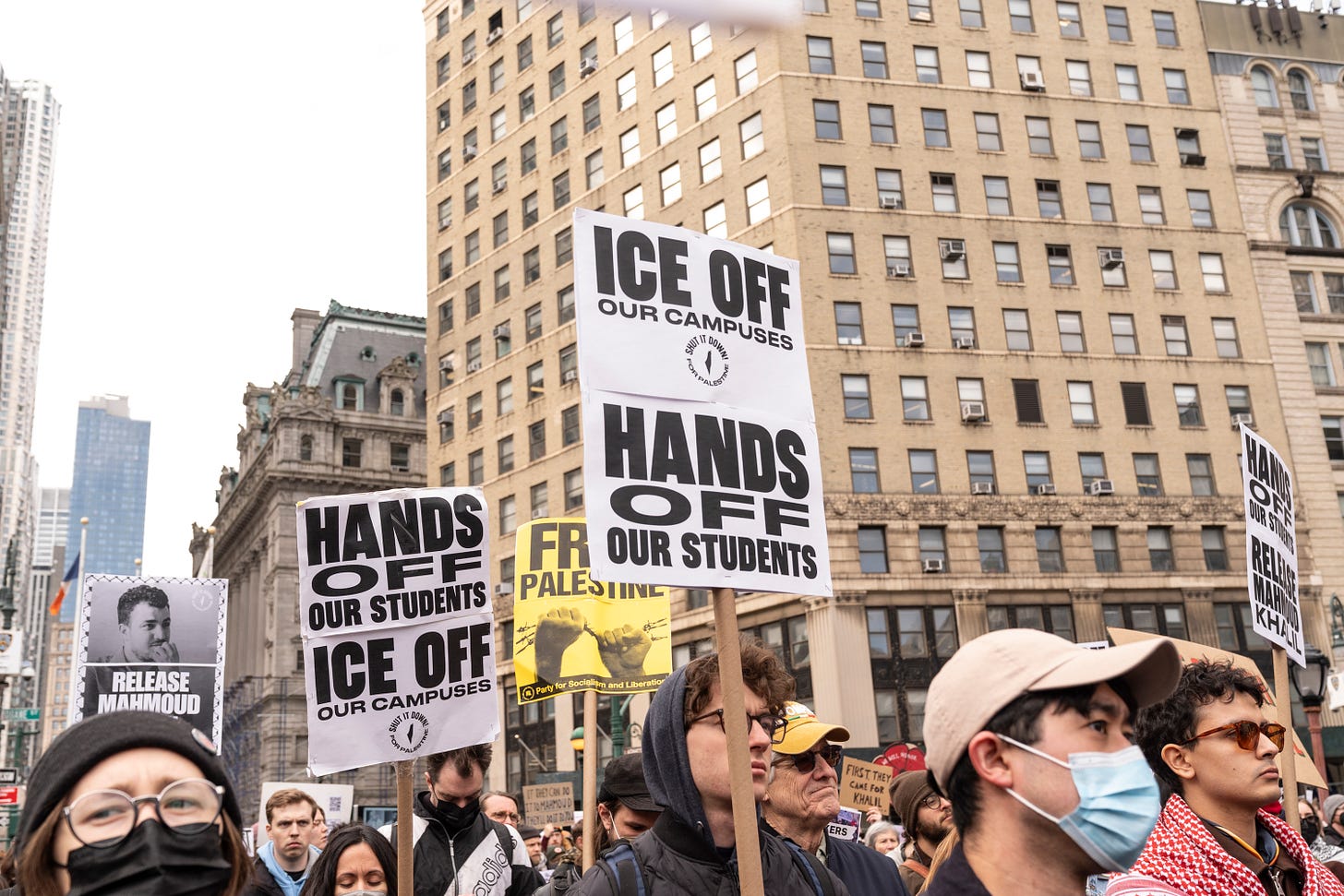
SCOOP: ICE Revoking Students’ Immigration Statuses Without Their or the University’s Knowledge
“Never seen something like this,” say university officials about the secret targeting of Middle Eastern students.

In a developing story, it appears the Trump administration is quietly targeting even more students for deportation and doing so in a way that is taking universities and the students themselves completely by surprise.
According to documentation seen by Zeteo and interviews with university officials, the administration is deploying the rarely-used risk-to-foreign-policy immigration provision they used to detain Mahmoud Khalil to now target students across the country.
University officials say that targeted students hail from the Middle East and Muslim-majority countries. They’ve also reported inconsistent notification patterns: some students have been informed about the revocations by the government, some have not; some only found out after officials manually checked internal visa status databases – while universities and officials themselves have mostly seemed to not be informed by the government.
Revocation by Pushing a Button
The Immigration and Customs Enforcement (ICE) appears to be manually revoking students’ immigration status – an authority typically left to university staff. And some students and universities are not even being made aware of those revocations – setting students up to be taken by immigration agents without even knowing it was coming.
Three university officials, who were given anonymity so they could speak freely, across the country report that, in recent days, student residency statuses in the Student and Exchange Visitor Information System – SEVIS, a database where residency statuses of foreign students are managed – are being changed without their knowledge.
Samah Sisay of the Center for Constitutional Rights told Zeteo that one’s visa being revoked does not mean that their status would be too. Unlike student visas – which are entry documents that allow someone to enter the country – student statuses are what allow people to stay in the US. To maintain one’s status, a student has to fulfill certain requirements, like being properly enrolled in classes, keeping documents up to date, and following work restrictions.
A student’s visa could expire or be revoked for any number of reasons, but that wouldn’t necessarily mean their status to stay would be taken away, too. Some of these statuses, which are typically overseen by university officers, are now allegedly being unilaterally revoked by ICE instead. While university officers often oversee status in the SEVIS system, Sisay said that DHS can technically revoke status without a university actively disenrolling a student.
Still, the practice is alarming students and university staff across the country. As one official put it, “Someone at ICE pushed a button, and now [students] are ‘illegal’ through a process that absolutely should not be happening.”
“Never Seen Something Like This”
According to documentation seen by Zeteo and university officials across the country, the unusual termination of students’ statuses has occurred just in recent days, as Secretary of State Marco Rubio has announced that the State Department has revoked at least 300 visas.
The reason? The same little-used rationale the State Department used to detain and attempt to deport Mahmoud Khalil, and an increasing string of students since then: A provision of Section 237 of the Immigration and Nationality Act — targeting students on the basis that their presence would have "potentially serious adverse foreign policy consequences" for the US.
In one case, a student was reportedly notified by the US that their visa was revoked per Section 221(i) of the act – which enables the Secretary of State to revoke visas per their “discretion” – and then that their status was terminated by Section 237.
In multiple cases, the US cited both the foreign policy provision and another portion of Section 237 to assert that the student was "otherwise failing to maintain their status.”
This appears to be what happened to Tufts University graduate student Rumeysa Ozturk, who was detained by masked immigration authorities on Tuesday.
Some university officials are discovering these by sheer accident, encountering the changes as they look through the SEVIS database.
A State Department spokesperson told Zeteo that the department “has broad authority to revoke visas under Section 221(i) of the Immigration and Nationality Act (INA),” and that they “exercise that authority when information comes to light indicating that a visa holder may be no longer be eligible for a visa.”
“Generally, the Department is not required to notify an individual of a visa revocation but does so when the Department determines it is practicable,” the spokesperson continued, adding that “the number of revocations is dynamic.”
DHS and the White House did not respond to Zeteo's requests for comment.
“I don't think there is a justification for ICE to do this. Not meaningfully, anyway,” said Hassan Ahmed, an immigration lawyer who is representing Georgetown scholar Badar Khan Suri, who was recently arrested by masked agents in Virginia.
“First, there's the issue of notice and opportunity to defend,” Ahmed told Zeteo. “Second, what policy sense does it actually make to pull the plug on expensive education halfway through? Third, if done on 237a4C grounds (foreign policy a la Mahmoud Khalil), then this is absolutely an abuse of that section of law.”
While much of the discourse surrounding college campuses has revolved around Ivy League colleges, virtually all the cases Zeteo reviewed occurred at state schools across the country.
As with several of the recent high-profile cases involving individuals whisked off the street, it’s unclear what actual grounds have justified the revocation. One university official told Zeteo that a student from the Middle East whose status was revoked said they had not attended protests or had social media posts that might have triggered the move (recall, Rubio’s State Department is reportedly using artificial intelligence to monitor social media and revoke student visas).
As one university official described the dynamic between student visas and student statuses: “What we appear to be seeing now is that there's no difference, there's no daylight between the two; that there are cancellations happening in SEVIS by the government; we don't really know if all students are getting notified or if some are getting notified…the schools are not getting notified.”
“We’ve really…never seen something like this, where it is so directly tied together,” they added.
If you are a student affected by this, or have relevant information about these developments, please contact me via email or Signal (premthakker.35).
And if you are already a paid subscriber to Zeteo but would like to increase your support for our accountability journalism, please consider a donation, too.
Editor’s note: This story has been updated with a comment from Hassan Ahmed.
Read more of Prem’s coverage of the US crackdown on foreign students:








Really, this has what America has become? A nation where bullies have been given a green light to bully innocent people. Really? A nation that condones disappearing people and welcomed legal guests without due process? A nation that targets vetted young scholars on visas anxious to contribute to a better world? Really? Rounding up young adults who come to America because they believed America is the shining city on the hill? Really? I am so deeply ashamed.
We have become the Nazis 🥺